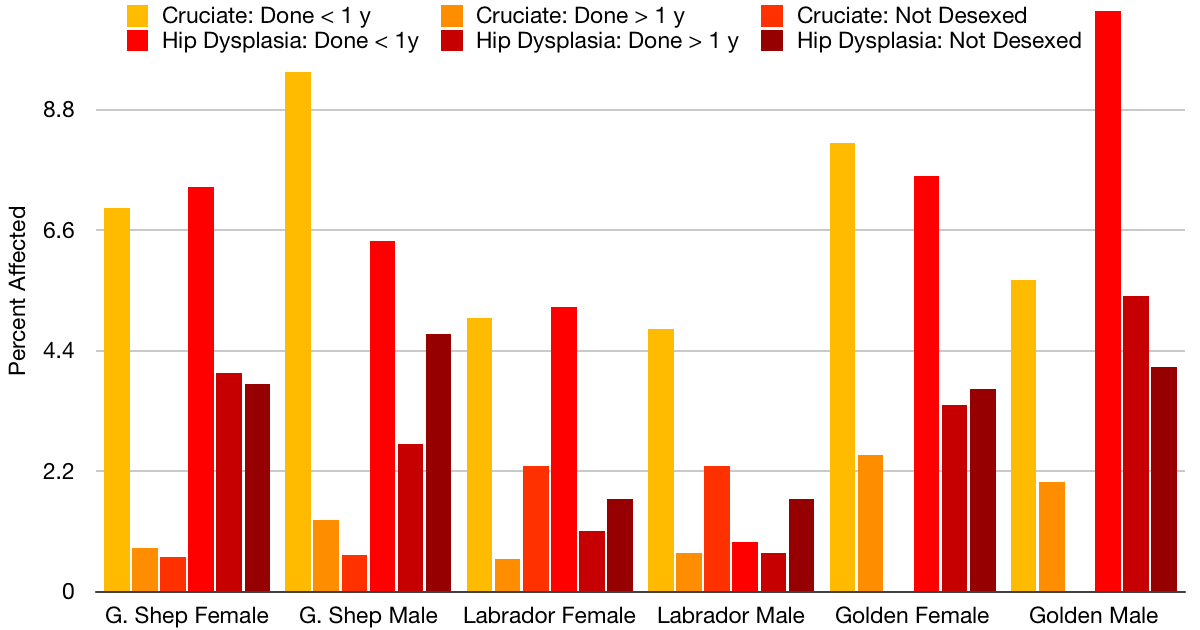Updated July 28, 2022
Whether you call it neuter, spay, castrate or desex, the right time to get it done in dogs is a subject of much debate. This is because it varies from breed to breed. Recently, a study was published on the best age for neutering in Labradors.
While the paper isn’t perfect (more on that later), it does provide the first evidence for Labradors on choosing a time of desexing with the fewest health problems. The study compared dogs neutered at different ages for their rates of:
- joint disorders: hip dysplasia (HD), cruciate ligament injury (CCL) and elbow dysplasia (ED)
- cancers: lymphoma (LSA), mast cell tumour (MCT), haemangiosarcoma (HSA), osteosarcoma (OSA)
- urinary incontinence (UI)
All of these have been suspected to be linked with the age of neutering. Here’s what they found (only bold values are significant, my summary to follow):
| HD | CCL | ED | At Least One | |
| Male < 6 months | 0/54 (0) | 4/58 (6.9) | 2/49 (4.08) | 6/48 (12.5) † |
| Male 6 – 11 months | 1/93 (1.08) | 3/100 (3) | 1/92 (1.09) | 5/88 (5.68) |
| Male 1 year | 2/65 (3.08) | 1/69 (1.45) | 0/65 (0) | 3/63 (4.76) |
| Male 2 – 8 years | 1/128 (0.78) | 1/128 (0.78) | 2/127 (1.57) | 4/124 (3.23) |
| Male Intact | 15/703 (2.13) | 17/701 (2.43) | 8/702 (1.14) | 40/684 (5.85) |
| Female < 6 months | 3/56 (5.36) | 3/59 (5.08) | 1/57 (1.75) | 6/53 (11.32)*† |
| Female 6 – 11 months | 4/120 (3.33) | 9/122 (7.38) | 0/125 (0) | 13/113 (11.5) † |
| Female 1 year | 4/69 (5.8) | 0/71 (0) | 0/72 (0) | 4/68 (5.88) |
| Female 2 – 8 years | 1/154 (0.65) | 4/153 (2.61) | 0/157 (0) | 5/147 (3.4) |
| Female Intact | 7/398 (1.76) | 11/399 (2.76) | 4/398 (1.01) | 23/396 (5.81) |
| LSA | MCT | HSA | OSA | At Least One | |
| Male < 6 months | 0/58 (0) | 2/59 (3.39) | 0/59 (0) | 0/59 (0) | 2/58 (3.45) |
| Male 6 – 11 months | 1/98 (1.02) | 0/100 (0) | 1/100 (1) | 0/99 (0) | 2/96 (2.08) |
| Male 1 year | 1/69 (1.45) | 2/69 (2.9) | 2/67 (2.99) | 0/68 (0) | 5/67 (7.46) |
| Male 2 – 8 years | 2/128 (1.56) | 7/125 (5.6) | 1/128 (0.78) | 2/129 (1.55) | 12/122 (9.84) |
| Male Intact | 10/696 (1.44) | 22/711 (3.09) | 10/697 (1.43) | 6/706 (0.85) | 46/678 (6.78) |
| Female < 6 months | 1/60 (1.67) | 0/60 (0) | 0/60 (0) | 0/60 (0) | 1/60 (1.67) |
| Female 6 – 11 months | 1/123 (0.81) | 5/126 (3.97) | 1/127 (0.79) | 1/127 (0.79) | 7/123 (5.69) |
| Female 1 year | 0/70 (0) | 1/71 (1.41) | 0/70 (0) | 0/71 (0) | 1/67 (1.49) |
| Female 2 – 8 years | 2/155 (1.29) | 8/152 (5.26) | 1/157 (0.64) | 1/157 (0.64) | 12/148 (8.11) |
| Female Intact | 7/395 (1.77) | 10/399 (2.51) | 2/397 (0.5) | 3/395 (0.76) | 22/389 (5.66) |
UI was reported at 2-3% in the spayed females up to 1 year.
Pictured here are the results of a larger study by the same research centre which show similar effects of desexing on CCL and HD in the Labrador.

Summary: The Best Labrador Spay & Neuter Times
Male Labradors only experienced joint problems when neutered under 6 months of age, whereas females had an elevated risk up to 1 year of age.
Recommendation: 1 year for both sexes,.
This is so far the only science we have for the best desexing age in Labs. Your vet, breeder or online group may have a different opinion based on their experience or personal beliefs. It’s perfectly reasonable to take their advice into consideration as well.
The decision may be based on other factors such as:
- local neutering legislation
- risk of pregnancy or reluctance to manage a female in heat
- health problems associated with intact dogs
Problems With This Study
In the original paper, the authors appear to make some recommendations based on very limited evidence. I have published the original study data so you can see the actual numbers involved and decide for yourself.
The authors also do not mention the well-known increase in lifespan associated with desexing male and female dogs, which tends to counteract most concerns about specific cancers. The following comment in the paper is a clue that it might also have been true for this population:
Across all breeds the mean age of last entry in the record for neutered males was 5.5 years (range 3.71–6.54), for neutered females 5.7 years (range 4.21–6.97), for intact males 4.9 (range 4.15–7.11), and intact females 4.7 (range 3.41–6.32)
The study tries to also look at the rates of mammary cancer & pyometra in females, but cannot give an accurate assessment for two reasons:
- the mean ages listed above are far too young to pick up most cases
- pyometra and mammary cancer are rarely referred to university hospitals
Regardless of any concerns, the authors are to be applauded to bringing into focus one of the most common questions from dog owners. For the Labrador at least, they’ve made the decision a lot easier.
Related: Best Desexing Age For 35 Breeds | Desexing Choices For Dogs | Costs Of Desexing
Have something to add? Comments (if open) will appear within 24 hours.
By Andrew Spanner BVSc(Hons) MVetStud, a vet in Adelaide, Australia. Meet his team here.

